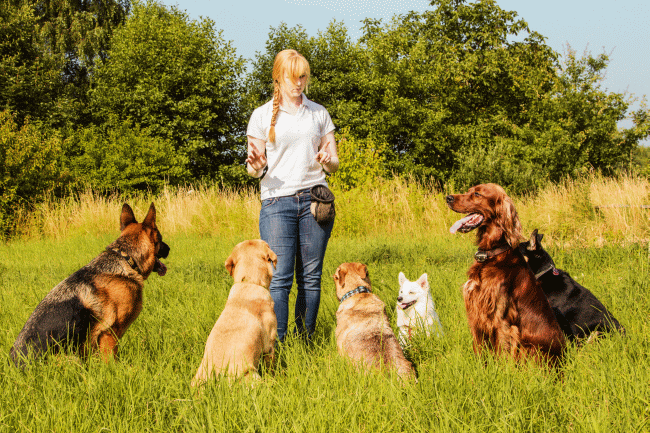Leading Pet Training Tips for a Mannerly Friend
Educating your pet to be a mannerly companion requires a nuanced understanding of canine behavior and the application of effective techniques. The journey to a courteous pet dog entails even more than simply these essentials; it demands a deeper exploration of strategies that can transform your training approach.
Recognizing Canine Actions
Understanding canine habits is important for efficient dog training and cultivating a harmonious partnership between dogs and their proprietors. Pets are intricate animals, exhibiting a large range of habits influenced by genetics, environment, and socializing. Identifying the underlying motivations for a dog's activities-- such as concern, exhilaration, or territorial impulses-- can substantially improve training performance.
Social interactions with various other canines and human beings play an essential function in forming actions. Pet dogs that experience positive socializing are generally a lot more adaptable and courteous.

Essential Educating Commands
Understanding essential training commands is critical for developing efficient interaction between pets and their proprietors. These commands offer as the structure for a mannerly pet dog and can significantly boost the total partnership between family pet and proprietor.
"Remain" enhances a dog's capability to remain in one position, advertising self-constraint. "Down" instructs your dog to exist down, which can help in handling thrilled habits. "Heel" instructs your pet to stroll along with you, cultivating far better leash manners.
Exercising these commands in various environments helps pet dogs generalize their training and react properly, no matter of interruptions. By spending time in showing these crucial commands, proprietors can cultivate an unified and considerate relationship with their canine friends, boosting both safety and security and satisfaction in day-to-day interactions.
Positive Reinforcement Techniques
Positive support strategies are vital approaches in pet training that concentrate on satisfying wanted actions to urge their recurrence. This approach leverages the natural understanding procedures of pet dogs, allowing them to link particular actions with positive results. By utilizing deals with, praise, or playtime as incentives, instructors can efficiently inspire dogs to repeat the behaviors they wish to reinforce.
To implement favorable reinforcement, it is essential to supply rewards immediately after the wanted habits takes place. This aids the pet dog make a clear link between their action and the incentive. Consistency is additionally important; incentives should be provided each time the preferred behavior is shown throughout the first training phase, progressively transitioning to a variable routine as the behavior becomes a lot more trustworthy.
Comprehending your canine's choices pop over to this site can boost the training experience. Eventually, positive reinforcement cultivates a relying on partnership in between the pet and owner, making training an extra satisfying and reliable procedure that constructs a mannerly friend.

Socializing Techniques
Effective socialization approaches are critical for a pet dog's growth, as they aid establish a well-shaped and certain buddy. Very early exposure to different environments, individuals, and other pets is necessary to avoid behavioral problems in their adult years. Start this process throughout the crucial socializing duration, which commonly happens between 3 and fourteen weeks old.
Present your puppy to varied stimuli, such as different surfaces, sounds, and scents. Regulated experiences with various other dogs and friendly people can promote favorable organizations. Young puppy classes are an exceptional resource, providing structured atmospheres for social communication and finding out fundamental commands.
Gradually raise the complexity of socialization experiences. Take your pet dog to parks, pet-friendly stores, and public events, ensuring each experience declares. Observe your pet dog's reactions and eliminate them from frustrating scenarios to prevent fear-based feedbacks.
Utilize favorable reinforcement to award calm and certain habits throughout social communications. Keep in mind, perseverance is essential; each pet has its very own rate for readjusting to new experiences.
Consistency and Routine
Establishing consistency and routine in pet training is necessary for promoting a feeling of safety and security and understanding in your pet dog. Dogs grow on predictability; visit homepage knowing what to anticipate helps them feel secure and minimizes anxiousness.
Including an organized routine right into your training sessions also improves your pet dog's learning experience - Dog training near me. Set up daily training sessions at the very same time every day, guaranteeing that both you and your canine are emotionally prepared. Short, constant training sessions are extra reliable than long, occasional ones; go for 5 to 10 minutes of focused training several check this site out times a day
Furthermore, uniformity needs to extend past official training sessions. Integrate training into day-to-day activities-- award your dog for sitting prior to dishes or walking calmly on a chain. This enhances found out actions and produces a natural training environment. In general, a consistent method, coupled with an organized routine, lays the structure for a mannerly buddy, promoting a harmonious connection between you and your pet.
Verdict
Positive support methods offer to urge wanted actions, while very early socializing prepares canines for varied atmospheres. By emphasizing these crucial aspects, the bond between owner and canine enhances, eventually leading to an unified and satisfying partnership.